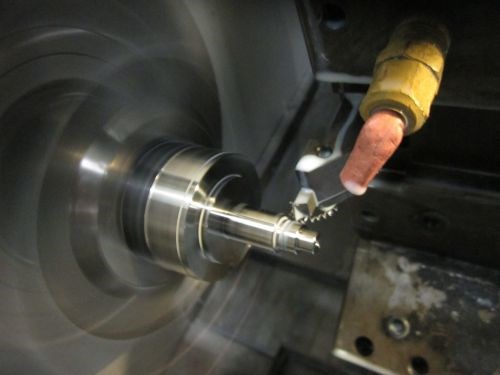In the Groove for 50 Years
It’s an American success story. In 1964, William and Hazel Kaiser founded a company to produce and market Thinbit, an innovative line of grooving tools. At first, the business operated out of the couple’s attic and garage. Fifty years later, the Kaiser Tool Company’s products continue to help shops such as Mack Tool and Engineering with successful solutions for demanding grooving applications.
Share





The Kaiser Tool Company is celebrating the 50th anniversary of its Thinbit grooving tools line in 2014. Though the company was founded in 1964 by William and Hazel Kaiser, Mr. Kaiser began developing the small grooving tools in the couple’s garage and attic in the 1950s. Such tools were not widely available at the time, and ordering custom grooving tools was expensive and time-consuming. The Thinbit line was created as a result, offering a selection of tools ranging from 0.010" to 0.050" in 0.001" increments.
Today, Kaiser Tool employs more than 40 people and produces nine different lines of cutting tools, including the Thinbit, Microbit and Littlebit lines. Its products are sold in the United States and 20 other countries worldwide. The company moved to its current industrial facility in Fort Wayne, Indiana, in 1994 and is still family-owned and operated. Lenore Perry, daughter of William and Hazel, has been company president since 1982.
Most important, Kaiser Tool Company continues to help manufacturing companies with successful solutions for demanding grooving applications. A good example is Mack Tool and Engineering, a contract shop in South Bend, Indiana, that is using Thinbit Groove ‘N Turn tools for tight-tolerance, application-critical operations such as cutting microgrooves on aluminum aerospace workpieces.

In the Mack Tool and Engineering example mentioned above, Joel Christensen uses Thinbit Groove ' N Turn inserts ranging in width from 0.0195 to0.065 inch with sharp and full-radius tips. He regularly achieves surface finishes of 16 to 32 Ra.
Related Content
-
How to Mitigate Chatter to Boost Machining Rates
There are usually better solutions to chatter than just reducing the feed rate. Through vibration analysis, the chatter problem can be solved, enabling much higher metal removal rates, better quality and longer tool life.
-
The Impact of Cutting Teeth Spacing on Machining Stability
Many cutter designs are available, and variable teeth spacing (or variable pitch) cutters can be used to influence milling stability. Let’s discuss why teeth spacing affects stability.
-
How to Accelerate Robotic Deburring & Automated Material Removal
Pairing automation with air-driven motors that push cutting tool speeds up to 65,000 RPM with no duty cycle can dramatically improve throughput and improve finishing.
















.png;maxWidth=300;quality=90)




